BOOKS YOU SHOULD READ!
This post is dedicated to books!
The following information was found at:
www.npr.org
The first book is:
'The Intuitionist'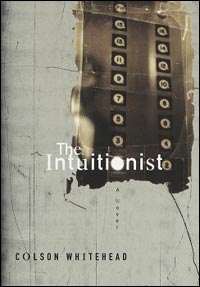
Some books are so imaginative that you wonder how the author can ever live up to his ideas. Colson Whitehead's The Intuitionist is one of those novels. In this case, Whitehead fully delivers on the promise of his premise. Part science fiction, part noir mystery, Whitehead's novel creates its own world and its own genre. Set in an unnamed city filled with skyscrapers (where elevators are therefore very important), Lila Mae Watson is the first black female elevator inspector. Not only is she set apart by her race and gender, but Lila Mae is among those inspectors known as "Intuitionists," who can judge an elevator's safety by instinct, as opposed to the "Empiricists," who are confined by the rigors of checklists before they declare an elevator safe. As the novel opens, the Elevator Guild's elections are coming up, and both Intuitionists and Empiricists are searching for the lost writings of James Fulton, the father of Intuitionism, and his plans for the perfect elevator which will render all current buildings obsolete. How Lila Mae becomes involved with this search and all its ramifications -- that touch on race and gender issues -- is written in a stylish prose that will bring to mind Kurt Vonnegut and Thomas Pynchon.
Read an excerpt.
The Second book is:
'Lost'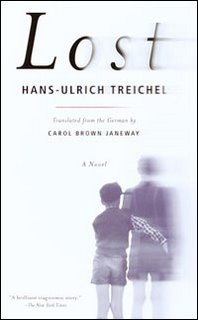
Although Hans-Ulrich Treichel has published poetry and nonfiction in his native Germany, Lost is both his first novel and his first book to be published in the United States. This small gem, smoothly translated from the German by Carol Brown Janeway, is set in 1950s Germany. It's told from the point of view of an eight-year-old boy, who learns that his older brother (whom he was always told had died of starvation during World War II) was instead given to a bystander in 1945, when his mother thought the family was going to be killed by the advancing Russian Army. Now the family learns that perhaps this older brother didn't die -- the government has identified a foundling (#2307) who just might be Arnold. While the young narrator and his parents go through a myriad of tests (think the painful absurdities of Kafka here) to determine if that particular orphan is indeed their brother and son, the narrator relates his feelings about what's happening to him in language that shifts beguilingly from crankiness to reluctant acceptance to recognition of both the ridiculousness and hopelessness of the family's situation. The ending is both unexpected and wonderful.
Read an excerpt.
The third book is:
'Banvard's Folly'
Paul Collins' Banvard's Folly: Thirteen Tales Of Renowned Obscurity, Famous Anonymity, And Rotten Luck is a collection of all-too-brief cautionary accounts of people who were famous in their own day but whose names ring no (or very few) bells today. Included among them are the artist John Banvard, whose three-mile-long panoramic painting of the shores of Mississippi River brought him both fame and unbelievable fortune in the mid-19th century until he decided to try to compete with P.T. Barnum and lost it all; Delia Bacon, who tried to prove that the fourth-rate actor, William Shakespeare, didn't write the plays that bear his name, but that they were written by a troika composed of Francis Bacon, Walter Raleigh and Edmund Spenser; A.J. Pleasonton, who believed that "blue light" (light streaming through blue glass) was a cure for ailments both physical and mental (only one of a number of medical quackeries Collins mentions); and Martin Farquhar Tupper, a household name in 19th century poetry circles, who was beaten out for England's poet laureate by no less a poetic eminence than Alfred Tennyson, and yet is totally unread and unknown today (except maybe in a few English departments). I suppose the lesson to be learned is that fame is, indeed, at best fleeting.
Read an excerpt.
The fourth book is:
'Whores on the Hill'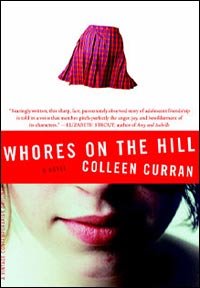
The reckless trio of teenage girls striding through Whores on the Hill, Colleen Curran's first novel, don't mind being referred to by other girls at their Milwaukee Catholic high school as the "the whores on the hill;" in fact, led by Astrid, they court their dicey reputation by wearing skirts shorter than anyone else, picking up motorcycle-riding dropouts, and generally raising hell as only rebellious 15-year-old girls can. Curran honestly and painfully lays it all out: first love, first betrayal by a best friend, and the inevitable tragic outcome of all that wildness. Here's a sample of her writing, describing a scene following an ill-advised evening of joyriding on motorcycles with boys they'd barely met: "At home, even in bed with the covers pulled tight, it still felt like we were flying, Astrid, Juli, and me, burning through our bare, balding town like a breath of wet fire. Our desire. We wanted the world. All of it, and now."
Read an excerpt.
The Fifth book is:
'Zarafa'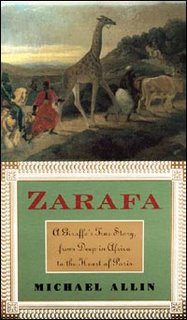
I can't imagine that the subject of giraffes is common fodder for discussion around the dinner table, but after reading Michael Allin's nonfiction tale, Zarafa: A Giraffe's True Story, From Deep in Africa to the Heart of Paris, it just might become the subject du jour. Allin follows the adventures of a young giraffe, sent to King Charles X of France in 1826 by the Ottoman Viceroy of Egypt. (He was hoping to deflect France's involvement in a little war he was conducting against Greece.) We learn of Zarafa's capture in Africa, her long sea voyage, first down the Nile to Alexandria, and then on to Marseille, and finally a 550-mile walk to Paris, accompanied by an ever-growing rapturous crowd of followers. But this is more than Zarafa's tale; it's a fascinating look at the early 19th century, filled with memorable descriptions of Napoleon (a voracious reader who led a well-read army), Étienne Geoffroy Saint-Hilaire, the great French naturalist (of whom I'd never heard before), and others. Zarafa herself is now on display in a museum in La Rochelle, on France's west coast, where you will be sorely tempted, as I was when I read this charming book, to go pay homage to a most lovely lady.
Read an excerpt.
The sixth book is:
'Spilling Clarence'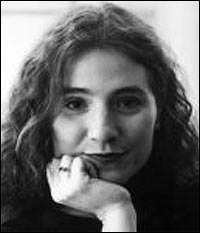
In Spilling Clarence, author Anne Ursu asks readers to consider what place our memories have in our lives, whether who we believe we are is a reflection of what we've chosen to remember, or to forget. In the small town of Clarence, a powerful drug gets into the water system, and everyone is now able to remember everything -- every single moment and incident -- about their pasts. For some, this is a blessing, but for others, who counted on the passage of time to make the past bearable, it's a heartbreaking nightmare. This is a witty, intelligent, and gracefully written novel, but it's particularly special because Ursu cares so deeply about her characters that the reader cares about them, too. Her seemingly intuitive understanding of the ways we invent and reinvent ourselves is breathtaking.
Read an excerpt.
You can find more suggestions and a audio report on these books at:
Librarian's Picks: Saving the Best for First
If it has been awhile since you have read a book, then it is time to do so!




1 Comments:
Zarafa sounds like an interesting book. Giraffes are facinating animals to watch in the wild. I have a video that I shot of giraffes in Kenya posted on my Save the Animals blog. You'll have to scroll down to find it.
Cheers
Post a Comment
<< Home